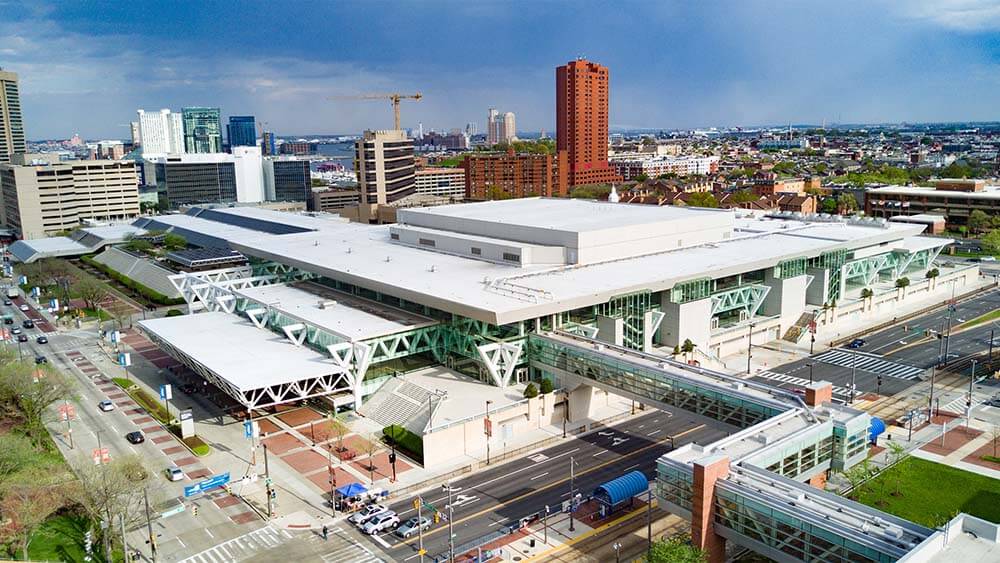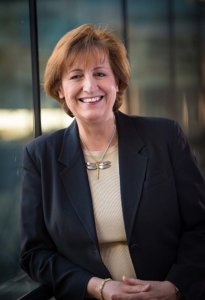
Peggy Daidakis, who is retiring as executive director of the Baltimore Convention Center this year, has worked there since before its official opening in 1979.
In 1978, Peggy Daidakis joined the Baltimore Convention Center just ahead of the facility’s grand opening in 1979. Just eight years later, Daidakis stepped into the role of executive director — the first woman to do so at a U.S. convention center. Since then, Daidakis’ steadfast dedication to her facility has earned her a legion of awards and accolades, as well as given her a catbird-seat view of an industry that, although evolving, is still firmly rooted in the same mission — customer service. “Technology may have changed,” she said, but “the expectations of excellent service have not.”
What has moved forward but still needs improvement is equity in leadership roles in the industry. “When I was at the beginning stages of my career journey, I watched the men advance and get paid more and felt the inequity in our profession,” she said. “I still think there is inequity, but the gap is closing and I hope I can continue to help close it for our future female leaders.” In this final installment of our series about women leaders in venue management, Daidakis shares more on what it was like to lead a convention center more than 35 years ago and what she’s looking forward to next.

“I believe today there are more opportunities to advance, and I am interested in mentoring young women about taking advantage of these opportunities.”
— Peggy Daidakis on gender equity in the industry
You were the first woman to take on the top executive role at a U.S. convention center. What was that like? How have you seen the industry change since then?
The industry was quite different in 1986 when I was appointed the first female director. There were fewer venues and women were not attracted to the operations side of the business. I did not realize the magnitude of the appointment at the time. I believe today there are more opportunities to advance, and I am interested in mentoring young women about taking advantage of these opportunities.
Where is there still room for improvement in terms of equity in leadership in venue management?
Part of the responsibility, I believe, is on the person to learn the various aspects of the industry and to push themselves out of their comfort zone. Leadership skills develop through identifying with individuals they admire and respect and learning from them. I do not believe there is a book or course that will make someone a good leader. I took the time to be mentored and met with people who I believed were good role models for me and my personality.
The meetings and events industry has taken many twists and turns over the last two years. Can you talk a little bit about how you have weathered that personally and from a leadership perspective? Are there ways in which you found yourself thinking differently as a result of the ongoing challenges to the meetings industry?
I am proud that I have served under nine mayoral administrations. When there was a change in leadership, I made sure that I learned the priorities of the new mayor and the team and adjusted accordingly. However, I would not compromise my commitment to provide the best team, the best service, and to be honest with the administration about what made our organization important to the city and state. I had to gain the trust and it looks like I did well. Regarding the industry specifically — I do not feel that much has changed. We are in the customer service business. Technology may have changed, the expectations of excellent service have not.
You retire next month. What advice do you have for young people entering the field right now, and what advice do you have to up-and-coming leaders following your footsteps?
I have worked for the city for 49 years and for [Baltimore Convention Center] for 44 years. It is so unusual for young people to think of working for the same company for more than a few [years] nowadays. I want to continue to work with young people, especially through International Association of Venue Managers’ (IAVM) mentoring program, to help them set their goals and share my experiences that will encourage them to consider venue management as a career choice. There are so many choices today and once you have the hospitality profession in your blood, it is hard to let go of it.
What’s the best piece of advice you were given in your career journey? Worst?
The best advice I received was from my mother. She advised me to stay the course, continue to work hard, be honest and transparent, and to be the best I could be. I should not worry about others, and I would be rewarded for who I am and what I have contributed. I can honestly say that she was right.
The worst? Can’t really think of one.
Can you share the moment that you think was your biggest career highlight? Biggest learning moment?
One of the biggest highlights of my career was being inducted into the Convention Industry Council (now Events Industry Council) Hall of Leaders. It was such an honor to represent the organization and the City of Baltimore for my achievements. Most of all, I was humbled that my staff nominated me. Biggest learning moment? I learn something every day. I cannot point out any one “ah-hah” moment.
Jennifer N. Dienst is senior editor at Convene. This interview has been edited and condensed for brevity.
More Women Leaders
Find more stories from Convene Senior Editor Jennifer N. Dienst’s series on women leaders at convention centers.
